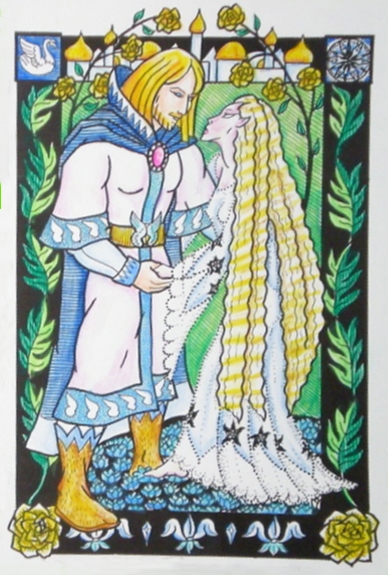
JRR Tolkien seems to enjoy the theme of mortal man to elf-maid romances leading to marriage. His wife's grave even bears one of these names.
After many alliances in battle and peace, Tuor (a human prince) and Idril (an elven princess) are married by King Turgon (Idril's father) and the entire city celebrates in an early draft. In the final Silmarillion, JRRT only celebrates them with a feast thus:
"the heart of Idril was turned to him, and his to her... So high did Tuor stand in the favor of the King that when he has dwelt there for seven years Turgon did not refuse him even the hand of his daughter;.. Then there was made a great and joyful feast, for Tuor had won the hearts of all that people, save only of Maeglin [a rival suitor] and his secret following; and thus there came to pass the second union of Elves and Men"
The first such was Beren and Lúthien wed in the Silmarillion. In pages and pages of trials, these vows are these:
"as she looked upon him, doom fell upon her and she loved him. But she slipped from his arms and vanished from his sight into the city, even as the day was breaking... and long ago in the Hidden Kingdom she laid her hand in his. Thereafter often she came to him, and they went in secret through the woods together from spring to summer; and no others of the Children of Ilúvatar have had joy so great, though the time was brief"After Lúthien led Beren before the throne of Thingol, as if he were an honored guest despite her father's outrage at her consorting with a mortal, Beren declares:
"here I have found what I sought not indeed, but finding I would possess for ever. For it is above all gold and silver, and beyond all jewels. Neither rock, nor steel, nor the fires of Morgoth, nor all the powers of the Elf-kingdoms, shall keep form the the treasure that I desire. for Lúthien your daughter is the fairest of all the Children of the World"Thingol, seething, still echoes his daughters "laying her hand in his" when sending Beren on a deadly quest for a Silmaril from Morgoth's crown, saying: "then, if she will, Lúthien may set her hand in yours."
Later, Lúthien makes her intent clear while Beren is vacillating to continue or end on this quest: "You must chose, Beren, between these two... but on either road I shall go with you, and our doom shall be alike" At last, when Luthien and Beren return to Thingol, 'hand' imagery returns:
"Therefore, at the last he yielded his will, and Beren took the hand of Luthien before her father."Most well known of all, Aragorn marries Arwen ("the likenes of Luthien") in Minas Tirith in Gondor (image below by the Hildebrandt Brothers) near the end of "The Return of the King":
"last [of the arriving elves] came Master Elrond, mighty among Elves and Men, bearing the scepter of Annúminas, and beside him upon a grey palfrey rose Arwen his daughter, Evenstar of her people.
"and Frodo when he saw her come glimmering in the evening, with stars on her brow and a sweet fragrance about her was moved to great wonder, and he said to Gandalf: "At last I understand why we have waited! This is the ending. Now, not day only shall be beloved, but night too shall be beautiful and blessed and all its fear pass away!"
"Then the king welcomed his guests, and they alighted, and Elrond surrendered the scepter, and laid the hand of his daughter in the hand of the King, and together they went up into the High City, and all the stars flowered in the sky. And Aragorn the King Elessar wedded Arwen Undómiel in the City of the Kings upon the day of Midsummer, and the tale of their long waiting and labours was come to fulfillment"JRRT writes a precursor to this in "the Fellowship of the Rings" in "Farewell to Lorien", when Galadriel, Arwen's maternal grandmother, asks Aragron's desire:
'Lady, you know all my desire, and long held in keeping the only treasure that I seek. Yet it is not yours to give me, even if you would; and only through darkness shall I come to it.'The gift Aragorn dared not ask for was, of course, Arwen herself who dwelt long in Lórien. The hopeful brooch was doubtless the elven marriage gift of a jewel, from the mother of the bride to the groom.
'Yet maybe this will lighten your heart,' said Galadriel; 'for it was left in my care to be given to you, should you pass through this land.' Then she lifted from her lap a great stone of clear green, set in a silver brooch that was wrought int he likeness of an eagle with outspread wings; and as she held it up the gem flashed like the sun shining through the leaves of spring. 'This stone I gave to Celebrían my daughter and she to hers; and now it comes to you as a token of hope. I this hour take the name that was foretold for you, Elessar, the Elfstone of the house on Elendil!"
Then Aragorn took the stone and pinned the brooch upon his breast, and those who saw him wondered; for they had not marked before how tall and kingly he stood, and it seemed to them that many years of toil had fallen from his shoulders. 'For the gifts that you have given me I thank you,' he said, 'O Lady of Lórien of whom were sprung Celebraín and Arwen Evenstar. What praise could I say more?'
The Lady bowed her head...

No comments:
Post a Comment